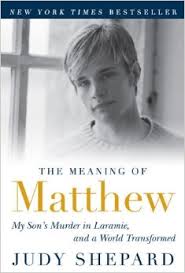 The Meaning of Matthew: My Son’s Murder
The Meaning of Matthew: My Son’s Murder
in Laramie, and a World Transformed
by Judy Shepard
Hudson Street Press. 288 pages, $25.95
JUDY SHEPARD was used to middle-of-the-night calls because her son Matt either couldn’t figure out the time zone difference or didn’t care. He lived in Wyoming, she lived in Saudi Arabia, and his early evening was her 2 AM. In the new book The Meaning of Matthew, she tells of the one call she’ll never forget.
Matthew Shepard had a hard life even before he was born. His mother reports that she was in labor for forty hours before the doctors finally did a C-section with her firstborn, who was a month early and born with jaundice. Once home, he was colicky. But the mother–son bond grew and strengthened, and the two spent hours doing things together and with other family members. She says she had an inkling that Matt was gay long before he came out to her, but it didn’t matter: he was her child, and that was that.
In the first half of her book, author Judy Shepard tells the story of her son’s life and death, his playful humor, and his quirkiness. She doesn’t gloss over her son’s problems—this story might have been ruined had she made Matthew out to be a saint—but she leads readers through his troubled life as completely as she is able to do. Matt naturally made conversation and friends easily, she reveals, and he loved to travel and meet new people. However, on a school vacation in Marrakech, he was attacked and raped by a random male stranger in an alley, an incident that affected him profoundly.
Back home, physically safe but depressed, Matt became restless, moving from city to city, self-medicating, and indulging in dangerous behavior. From their home in Saudi Arabia, the Shepards practiced supportive “tough love” and tried to let Matt sort things out for himself, but the situation was worse than they realized. Bills weren’t paid. He sometimes went days without bathing and weeks without calling. One day in October, following a long-distance disagreement over money, Matt phoned his mother to apologize. It was the last time Judy Shepard heard his voice.
“Matthew Wayne Shepard died… Monday, October 12. But our beloved, opinionated, compassionate, contentious, curious, and loving son had died five days earlier, tied to [a]fence outside Laramie.” So begins the second half of one of the most courageous, painful books to be printed this year. It’s this section of the book that’s so painful to read, in which Judy Shepard discloses the depth of her grief, her wish that she could turn back time to help Matthew more, to keep him out of harm’s way. And she takes us back to the trial of the men who beat Matt and left him for dead because he was gay, and how fervently she had wished for the strongest possible penalty for one of the men (curiously, she seems forgiving toward the other). She relates the horror she felt at seeing her son’s clothing as evidence, and how hard it was to remain stoic in the courtroom.
Shepard writes in a quiet, graceful voice about love, acceptance, and having a hole in one’s heart the size of a missing child. Some readers may want to quarrel with parts of The Meaning of Matthew—such as its discussion of the death penalty and matters of untreated depression and mental illness in the gay community—but these asides do not detract from the main narrative. While Matthew became a national symbol for homophobic victimization, for Judy Shepard it is the story of a mother and the tragic loss of her son.






